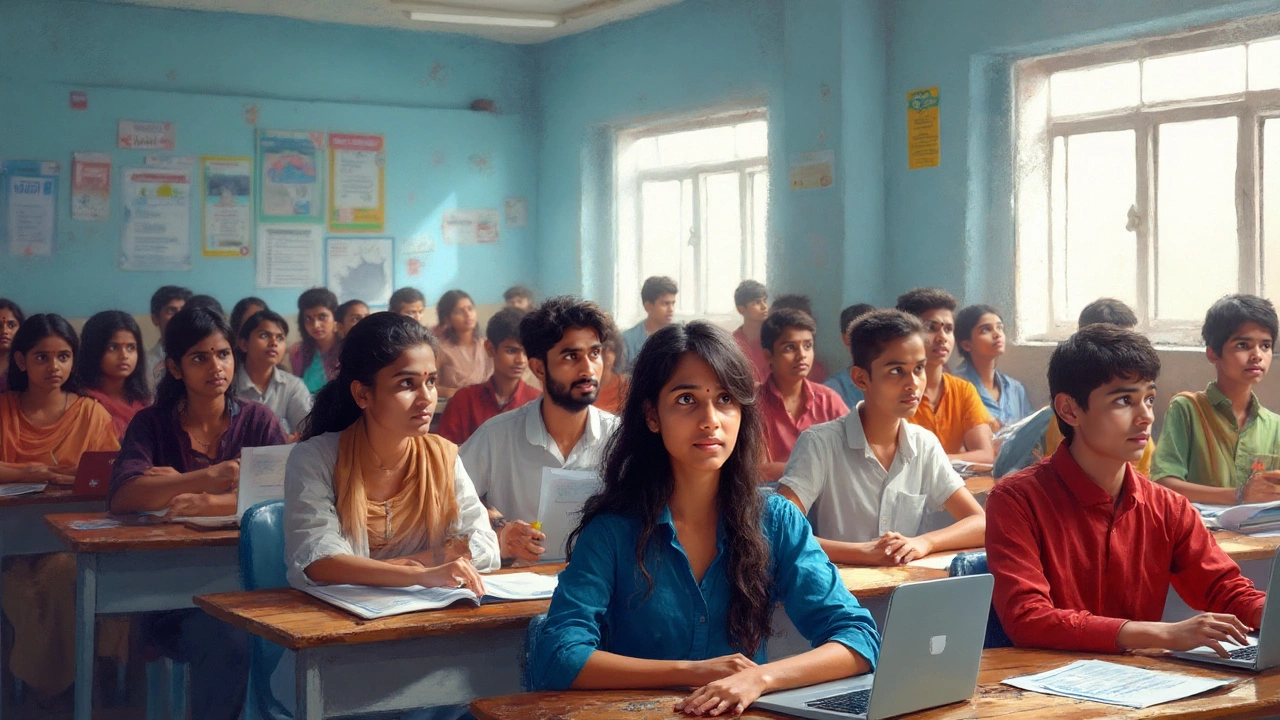
Struggling to find accurate info on English speaking course fees in Delhi? You’re not alone. The city’s language institutes guard their pricing like a family recipe. Walk down any market lane—from Lajpat Nagar to Rohini—and you’ll see banners promising cheap, fast English mastery. Everyone wants quick results, but why is the cost bracket so wide? Is a pricier course truly better, or is that clever marketing? Here’s what no sales agent will tell you: real costs, what you’re paying for, how to spot a good bargain, and even a couple of secrets that can save thousands. Let’s peel back the curtain on what English speaking courses in Delhi actually cost in 2025 and what you should look for before paying anyone a rupee.
What Influences English Speaking Course Fees in Delhi?
It’s tempting to think there’s a simple price tag for English classes, but that hope disappears the minute you start searching. Prices jump higher than Delhi’s summer temperatures: some places will quote Rs 2,500, others go as high as Rs 50,000 for seemingly similar programs. So, what’s behind these wild differences? First, the reputation of the institute plays a big role. Brands like British Council and Inlingua have spent years building trust; their certified trainers, global curriculum, and plush classrooms naturally command higher fees. Most of these high-profile centers charge between Rs 15,000 to Rs 35,000 for a standard three-month program. You pay not just for the lessons, but for internationally recognized certificates and exposure to authentic accents.
But hold up—fancy names aren’t everything. Some homegrown academies offer fantastic training for half the price. These local players often employ experienced teachers who speak your language, know common mistakes, and can help you practice without any embarrassment. Their typical range? Somewhere between Rs 5,000 and Rs 12,000 for a regular 90-day course. Street-smart Delhiites often switch to these homegrown batches after attending a pricey demo elsewhere.
Another fee influencer is the type of course you pick. Are you looking for simple conversational English, business communication, accent neutralization, or all of it rolled into one? General spoken English programs cost the least (think Rs 4,000–8,000 for basic batches). For advanced modules—presentation skills, interview soft skills, or public speaking—add another Rs 10,000–15,000. The more customized your course, the fatter the bill. Want private, one-on-one attention? Be ready to pay Rs 1,000–Rs 2,500 per session. You pay for the teacher’s time, which isn’t cheap in a metro city.
Batch timing and format also matter. Morning and afternoon batches tend to be slightly cheaper than evening ones (because working professionals flood the post-6 pm slots). Offline classes at prime locations (think South Delhi and Connaught Place) cost more. Online courses—since the COVID-19 digital boom—tend to be a little cheaper, with most institutes offering 20–30% discounts for virtual-only classes. You’ll see offers like Rs 2,000–6,000 for short-term online workshops. Many also throw in bonus modules or placement assistance as sweeteners.
Let’s not forget hidden extras. Registration charges (generally Rs 300–1,000), course material (usually included, but some make you buy textbooks separately), and test/certificate fees can sneak up and inflate your budget. Fancy certificates or British Council affiliation? Those can add Rs 1,000–3,000 to the bill. It’s smart to ask for a transparent quote before making any payments. Here’s a quick fee snapshot of popular institutes as of August 2025:
| Institute | Typical Fee Range (3-month course) | Includes |
|---|---|---|
| British Council | Rs 15,000–Rs 35,000 | Certificate, library, group activities |
| Inlingua | Rs 10,000–Rs 30,000 | Interactive lessons, personalized feedback |
| Engmates | Rs 6,500–Rs 15,000 | Group practice, material, interview prep |
| Bafel | Rs 7,000–Rs 16,000 | Soft skills, mock interviews, certificate |
| Online Local Classes | Rs 2,500–Rs 8,000 | Live sessions, e-materials, WhatsApp support |
Here’s a little secret: walk-in discounts are real. Many trainers slash up to 20% off if you show genuine interest or bring a friend. Never be afraid to negotiate—Delhi’s English academies expect it! The real trick? Don’t just look at fees. Dig into what’s included: teaching hours, batch size, number of practice sessions, after-class support, and whether you’ll get real feedback. Ask for a demo class and pay attention to the classroom energy—sometimes, a mid-range local batch can outperform a glossy international brand.

Tips to Get the Best Value from Your Spoken English Course
Everyone wants to get ahead, but no one wants to get ripped off. So, how do you make sure you’re getting your money’s worth? Always start by lining up your goals. Do you want to brush up broken English, crack tough interviews, or shine in public speaking events? Figure this out before you pay. Here’s a pro tip: avoid courses that promise you’ll speak ‘fluent English in 30 days.’ That’s usually wishful thinking—language skills need time, practice, and patience. Most people see real improvement using three things: regular speaking practice, consistent feedback, and a dose of public embarrassment (yup—making mistakes in front of others actually speeds up learning). If your chosen academy offers these, that’s gold.
Check if the institute provides demo classes. This is your best chance to see the teaching style in action—no glossy website or five-star Google review can beat that. In a demo, note how the trainer involves each student. Are people encouraged to speak? Is feedback personalized, not generic? Are you corrected respectfully, without shaming? That’s the sign of a solid institute.
Batch size is another sneaky factor. Anything more than 13–15 people and your speaking time shrinks. Ideally, go for batches of 8–12 so you get genuine practice instead of silently listening to theory. Some institutes show off big classrooms, but you want lots of practice, not a packed audience. Online classes can actually work well if the teacher knows how to handle Zoom breakout rooms for role plays or Q&A.
If you’re busy, ask about fast-track or weekend batches—these are designed for college students and working professionals who need flexibility. While you’re at it, clarify how many hours each batch covers. Short courses may advertise 'two months,' but you might only get 20 hours. Check: Will you get free access to extra speaking clubs, workshops, or doubt-clearing sessions?
Don’t just fall for the most expensive option. Sometimes local trainers—those who’ve taught CBSE students or coached BPO candidates—deliver practical results at half the price of fancy chains. What matters is regular speaking slots, a supportive atmosphere, and honest feedback. Big brands like British Council are great if you need a formal certificate for a visa or job, but don’t underestimate homely classrooms in Rajouri Garden or Karol Bagh if you just need real-world skills.
The best way to learn English? Do it every day, whether at your institute or by joining language meetups and online forums. Delhi’s got hundreds of WhatsApp practice groups, and even local libraries host open mic English events. Track your progress—record yourself once a week and notice your improvement. Some students find apps like HelloTalk and Tandem useful for extra conversation partners, often for free.
And here’s something most people miss: ask for discounts. You might snag a better deal if you pay for a full year or bring a friend along. Institutes often prefer filling batches, so don’t hesitate to ask for a price cut, trial period, or even group rates. Also, look for seasonal deals—many academies slash prices during Diwali, Holi, or just before schools reopen.

English Speaking Course Fees: Answering Key Questions from Delhiites
Every year, thousands of Delhiites sign up for English speaking classes, hoping to upskill or simply keep up with their peers. Lots of people have similar doubts swirling in their heads, so let’s answer the ones that come up the most.
English speaking course fees in Delhi are not always fixed—institutes revise them every 6–8 months, especially after March and September, when new batches start. Don’t expect 2023 pricing in late 2025. Inflation, demand spikes, and even currency rates (yes, big brands pass this on!) push up prices regularly. For example, one top-rated chain increased its fee by 20% after COVID and again after last year’s Board exam rush.
Here’s a breakdown of the most common fee-related questions:
- Are there any good courses under Rs 5,000? Yes, but you need to hunt in crowded markets or try new online academies. You’ll get basic conversation-level skills, sometimes in a bigger batch, but that might be enough if you just need confidence, not written perfection.
- Will I get a job if I do a spoken English course? No one can guarantee job placement, but many institutes offer free interview training, resume writing sessions, and soft skills workshops. Combine your new language skills with job portals, and watch your opportunities open up.
- Is the certificate recognized everywhere? Not always. British Council and Inlingua certificates carry weight for jobs and student visas abroad. Others are mainly useful for boosting your LinkedIn or showing you made the effort.
- Can I pay in installments? Most places agree to split your fees into 2–3 payments, but you need to ask upfront. Some tack on an extra charge, while others do it for free to fill the batch.
- Is group learning better than one-to-one training? Depends on your shyness and comfort with strangers. Group training is cheaper, lets you make mistakes without feeling singled out, and gives more real-life interaction. One-to-one is perfect for fast results or if you need prep for a specific interview.
- Who should pick online courses? Anyone who wants to save commuting time, hates Delhi traffic, or feels nervous in groups. Just make sure to choose an online batch with enough live sessions, not just pre-recorded videos.
One tip that works for most? Use your demo class to observe, not just participate. Notice how the trainer reacts to your questions, whether the class is lively, and if the environment pushes you to speak up. Don’t waste your time on places where the teacher spends the whole class on grammar and barely lets anyone talk. Remember, spoken English means you should be, well, speaking!
If you’re still unsure, go for a short-term weekly batch to test the waters before joining the main program. Many local Delhi academies (especially in Laxmi Nagar and GTB Nagar) offer week-long trial periods at a nominal fee. That way, you know what you’re paying for—no surprises.
And don’t forget: learning English is about your effort outside the classroom too. Even the best course can only open the door—you have to walk through it by chatting with friends, listening to podcasts, or even arguing with chatbots. The right course is just the best starting point.

